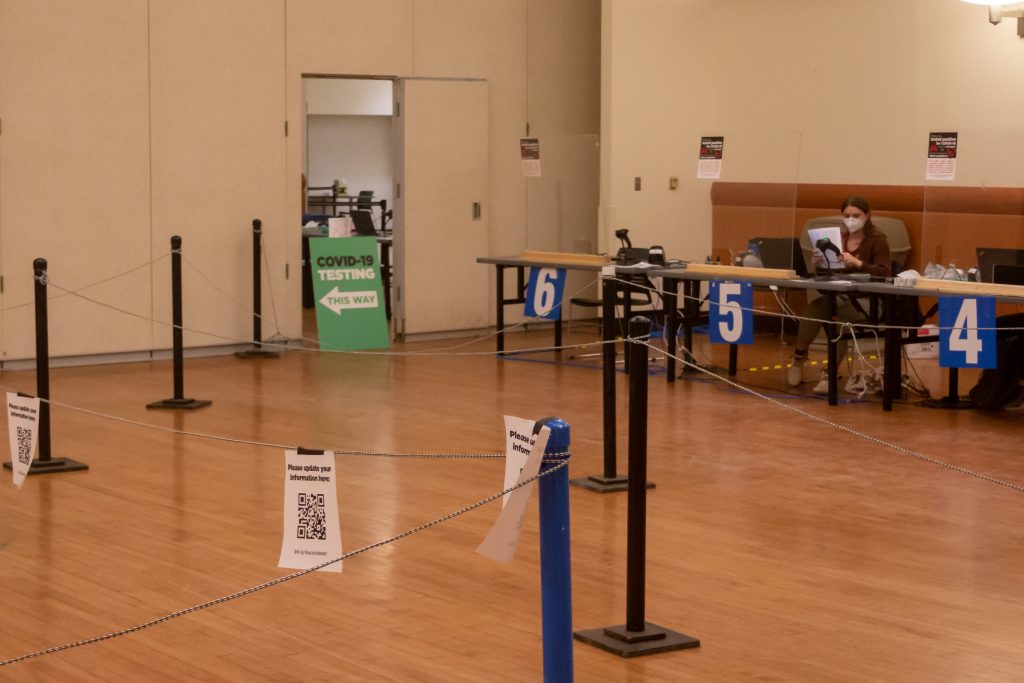After a surge in national COVID-19 cases this winter, Binghamton University has introduced new policies to keep positive cases at bay.
Off-campus students with an on-campus presence were required to get tested for COVID-19 within 72 hours prior to the first day of classes, submitting an attestation online. In addition, the University has reintroduced surveillance testing, now on an approximately once-a-month basis, for all students with an on-campus presence, also requiring such students to receive the booster vaccination by Jan. 20 or within 30 days of becoming eligible. More information on vaccine compliance can be found here
COVID-19 cases have remained relatively low among students entering the first week of classes, with only 83 positive cases resulting from 8,375 tests performed in the last 14 days, as per the SUNY COVID-19 Case Tracker. BU’s rolling 14-day positivity rate of 0.99 percent is well below the New York state number of 12.7 percent.
Ryan Yarosh, senior director of media and public relations at BU, described the data as cautiously optimistic.
“So far, the numbers are very encouraging, and we are confident we can have a productive in-person semester,” Yarosh wrote in an email. “At the same time, ensuring the health and safety of our campus community is our highest priority, and it is imperative that everyone follows the latest guidance with that in mind. Things can change quickly and we will continue to monitor the data and revisit adding or lifting requirements as appropriate.”
To aid students in getting the booster vaccination prior to the start of classes, the University made available a temporary on-campus booster clinic, with three dates available for on-campus students to receive a vaccination, and one day available for off-campus students. According to Yarosh, the University will continue to schedule clinics if there is continued demand.
While BU required off-campus students to test themselves 72 hours prior to the start of classes, it did not provide a testing facility for them to do so. Some students described the University’s method of proof, a Google Form attestation, as a potentially flawed system.
Briana Mannarino, a senior majoring in psychology, was able to purchase a self-test kit for herself, but questioned the attestation form’s efficacy for other off-campus students.
“I’m sure there are people who were honest, but a lot of people will put their desire to see friends and go out and party when returning to [BU] ahead of safety, because it was so easy to lie and be able to dodge the quarantine period since they only made [students] click a button on a Google Form,” Mannarino wrote. “Even allowing self-tests was a bit of a surprise to me, because if the test is done improperly it can show a false negative.”
According to Yarosh, the University has added testing capacity during the first week of classes for any off-campus students who were unable to get tested for COVID-19.
“The attestation is the form of proof for off-campus students,” Yarosh wrote in an email. “We expect our community to respond in good faith two years into the pandemic. There are almost twice as many testing lanes in the testing center for the first week of classes.”
BU has also continued to implement a mask mandate for indoor public spaces, citing a recent decision by the New York Court of Appeals. On Monday, a New York State Supreme Court judge ruled that Gov. Kathy Hochul’s mask mandate was invalid due to the governor overstepping authority by not consulting the New York State Legislature. New York State Attorney General Letitia James requested a stay on the ruling on Tuesday, approved by an appeals court judge later that afternoon.
On Jan. 3, the University had sent out a B-Line News Addition announcing the requirement of a booster vaccination for any student with a regular on-campus presence, following a decision by Gov. Hochul and SUNY. All students were required to upload proof of vaccination to the Decker Student Health Services Center Patient Portal, and residential students were also required to show proof of vaccination during move-in.
“Requiring the booster is also a major factor in being able to spread out testing and not crowd or oversaturate the testing center — before the vaccine was widely available I remember how crowded the surveillance testing room was since it was weekly rather than monthly testing, so this is definitely a step up in avoiding further infection of more people by not overcrowding the testing rooms,” Mannarino wrote.
Mason Weaver, a sophomore double-majoring in business administration and German, also said he saw benefit in requiring the booster vaccination, and said he was able to receive his vaccination without issue. As an on-campus resident, however, Weaver said he was impacted by the lack of access to the College-in-the-Woods dining center, which has been closed to support students in quarantine and isolation.
“Overall, [BU] has had a lot on its plate during these times,” Weaver wrote in an email. “I feel for the faculty and staff, but I do wish that certain things could be different. Having [College-in-the-Woods Dining Center] permanently designated as the quarantine housing meal provider has without a doubt affected the eating habits of everyone that I know living here negatively.”
On Dec. 31, Gov. Hochul had also announced the requirement of all SUNY faculty to be vaccinated for COVID-19, but the mandate for faculty is still under negotiation. According to Yarosh, 94 percent of faculty and 84 percent of staff have already been vaccinated.
As COVID-19 cases continue to remain low among students, BU President Harvey Stenger thanked those involved in the move-in process, describing and lauding the efforts of staff and the compliance of students.
“If I had the opportunity, I would personally thank every individual who helped [BU] have such a smooth move-in process to start this semester — students, staff, faculty and families — but the numbers are too great,” Stenger wrote in a Dateline announcement. “Instead, please accept my thanks electronically for a job well done.”



